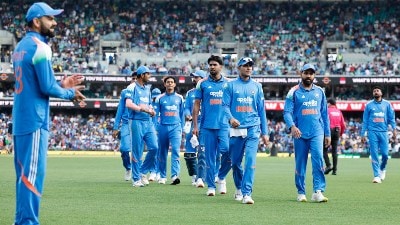Missed chances
The relationship between India and Pakistan is so tortured that even half a step in any direction is perceived as being loaded with much mea...

The relationship between India and Pakistan is so tortured that even half a step in any direction is perceived as being loaded with much meaning. Seasoned diplomats, used to the nuances of the English language, watch the dictionary and the thesaurus like hawks on this beat. Responses are debated threadbare. Often, bureaucratic caution decrees that responses are done away altogether. That8217;s what happened on January 12, 2002, in the days following a major televised address to his nation by President Musharraf. Only a month before, terrorists had attacked Parliament and a furious nation, blaming Pakistan for the attacks, had readied itself for war. Air links were broken off and the High Commissioner recalled. It was at this time that Washington and London, nervous that a conflict would lead to nuclear conflagration, put pressure on Musharraf to read out the riot act 8212; literally 8212; to terrorists, banning the more vicious ones like the Lashkar-e-Toiba, the Lashkar-e-Jhangvi and the Sipah-e-Sahba. That would encourage the anti-war lobby in India, the foreigners said, and give them more breathing room. US Secretary of State Colin Powell was on the phone to the General almost every day, some say he even wrote out the TV script for him.
Musharraf adhered to the script. Much to the delight of the MEA, he banned the said terrorist groups in Pakistan. At which point South Block proposed that India should 8216;8216;declare victory8217;8217; and send back its High Commissioner to Islamabad. But other voices louder than the MEA prevailed. New Delhi lost the opportunity to restore bilateral ties. In fact, a second opportunity to save face and withdraw troops from the border occurred soon after Islamabad promised the US that it would end terrorism last June. A High Commissioner was designated 8212; Harsh Bhasin, who has since been posted as India8217;s newest Prince of Denmark to Copenhagen 8212; and MEA leaked stories about the steps, like the restoration of air links, it intended to take. Islamabad, knowing full well that New Delhi was desperate to get back flying rights over Pakistan, reacted dismissively to the leaks. Four months later, the government had to unilaterally withdraw its troops from the border.
Letter diplomacy
If you thought that some lobbies in India could take the cake for cussed protocol, think again. Turns out that Pakistan, as much interested in restoring bilateral relations but knowing not how to do so, had sort of decided that it would respond 8216;8216;positively8217;8217; to Vajpayee if he sent a warm, congratulatory letter to Prime Minister Jamali on his election late last year. But Vajpayee had decided to play it ultra-cool too, so the poet-PM ended up penning the most devastatingly straightforward lines. Something like, 8216;8216;I congratulate you on your election as8230;8217;8217;, instead of, 8216;8216;A new dawn has broken with your election, praise be to Allah that this new dawn brings new hope and cheer and happiness8230;8217;8217;etc etc.
Sources in Pakistan say that the new PM had decided that if he received a warm and friendly letter from his Indian counterpart, he would take the opportunity to end the face-off by reopening air links. But when Vajpayee8217;s politically correct letter, as cold as the wind back home in Baluchistan appeared, Jamali decided he couldn8217;t save Vajpayee8217;s face before his own. Nothing happened. That8217;s one of the reasons why it took another six months for both sides to properly break the ice between themselves.
Start of dialogue?
Still, it must be General Musharraf8217;s encounter with India8217;s charge d8217;affaires TCA Raghavan over lunch at the Serena hotel part of the Aga Khan hotel chain in Islamabad on Sunday, that everyone8217;s really talking about. Turns out that Raghavan had taken a Pakistani journalist from the Friday Times out for lunch at this restaurant. In walked the General, followed dutifully three steps behind in true sub-continental fashion by wife Sehba, and some friends. The entire restaurant rose in honour of the gentleman. When the Friday Times journalist rose too, Raghavan found he could hardly keep sitting. So the good General went around the restaurant, shaking hands that had only seconds before been dipped into the 8216;8216;dal makhani Dera Ismail Khan8217;8217; and 8216;8216;butter chicken Ludhiana8217;8217;. Or some such. When he came to Raghavan8217;s table, the journalist of course introduced him to our man in Islamabad.
The restaurant then went back to its business of eating, guests casting furtive glances at the chief table 8212; when Musharraf decided he needed seconds at the buffet table, and so got up to refill his plate. On his return journey, Raghavan8217;s table lay in the way. 8216;8216;When is your boss coming,8217;8217; asked Musharraf, a five-word sentence that has since engendered a wealth of meaning in the loaded India-Pakistan relationship. 8216;8216;Soon,8217;8217; said Raghavan, short and sweet. And that was the beginning of the official dialogue in the summer of 2003 between the two sides.
Still, this diary cannot conclude without telling you about the intrepid Friday Times journalist. At the end of the lunch, he got up and went over to the General8217;s table and asked for an interview. Naturally, Musharraf promised him one.
- 01
- 02
- 03
- 04
- 05































